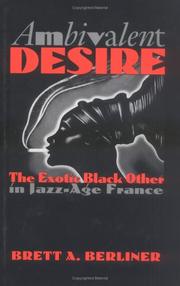
Ambivalent desire
By Brett A. Berliner
Subjects: France, history, 20th century, Blacks, france, Black people, France, race relations, Blacks, History, Race relations
Description: "The 1920s have long been known as an era of negrophilism in France, a time when everything associated with blacks and black culture became fashionable. The exotic appeal of the negre manifested itself in a variety of ways - from the popularity of jazz and celebrity of Josephine Baker to a flourishing of love across the color line - and contributed to the reputation of France as a racially tolerant society. Yet on closer scrutiny, Brett A. Berliner argues, it becomes clear that French attitudes toward blacks were at best ambivalent and the ideal of racial tolerance more myth than reality.". "Through an analysis of popular imagery, exotic fiction, travel writing, and other cultural texts, Berliner shows how the representation and reception of blacks in post-World War I France embodied competing, at times contradictory, perceptions. On the one hand, African and Caribbean blacks were depicted as a source of cultural renewal and a means for celebrating life and sexuality. On the other hand, interracial relationships were seen as a threat to French civilization, a notion reinforced by grotesque advertisements, ethnographic exhibitions, and other aesthetically repulsive images of "primitive" blacks."--BOOK JACKET.
Comments
You must log in to leave comments.